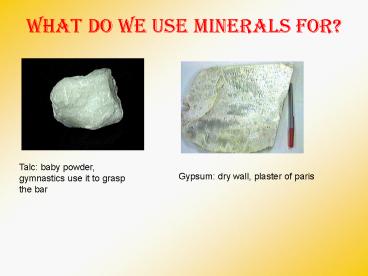What do we use minerals for - PowerPoint PPT Presentation
1 / 18
Title:
What do we use minerals for
Description:
4. Hydrothermal solutions hot mixture of water & dissolved substances. ... Hydrothermal Solutions. Acronym: Can People Please Think Harder! Mineral Groups. Silicates ... – PowerPoint PPT presentation
Number of Views:243
Avg rating:3.0/5.0
Title: What do we use minerals for
1
What do we use minerals for?
Talc baby powder, gymnastics use it to grasp the
bar
Gypsum dry wall, plaster of paris
2
Halite Salt
Copper electrical wires, sculptures
Quartz electronic equipment, radios, computers
3
Jennifer Lopezs pink diamond
The Hope Diamond
4
2.2 Minerals Definition of a Mineral
A. Naturally occurring natural geologic
processes
B. Solid substance within the temp. ranges
normal for Earths surface.
C. Orderly crystalline structure means that
their atoms or ions are arranged in an orderly
repetitive manner.
5
D. Definite chemical composition most are
chemical compounds made of 2 or more elements.
There are a few exceptions like Gold or Silver.
E. Inorganic - not living or never have or never
will be.
6
How Minerals Form everywhere on earth and under
different conditions.
- Crystallization from magma as magma cools
elements combine to form minerals. - 1ST minerals to crystallize from magma are
usually rich in Fe (iron), Ca (calcium), Mg
(magnesium) - As minerals continue to form, the composition of
the magma changes. Minerals rich in Na (sodium),
K (potassium), Al (aluminum) then form.
7
2. Precipitation
- Water on Earth evaporates. Dissolved
substances left behind react to form minerals. - Changes in water temperature may cause
dissolved material to combine and precipitate
(fall) out of a body of water.
8
3. Pressure and temperature some minerals form
when existing minerals are subjected to changes
in pressure temp.
- Increase in pressure - mineral can
recrystallize while still a solid. - Change in temperature certain minerals
become unstable new minerals form that are
stable at the new temp.
9
- 4. Hydrothermal solutions hot mixture of water
dissolved substances. - Have temperatures between 1000C - 3000 C
- When these solutions come into contact with
existing minerals, chemical reactions take place
to form new minerals.
- When such solutions cool, some elements in
them combine to form minerals.
10
Minerals Formed as a Result of Crystallization of
Magma
11
2.2 Minerals
? Minerals can be classified based on their
composition
1. Silicates most common
- Silicon and oxygen combine to form a structure
called the silicon-oxygen tetrahedron. This
silicon-oxygen tetrahedron provides the framework
of every silicate mineral just add one or more
other elements.
12
The Silicon-Oxygen Tetrahedron
1 silicon atom 4 oxygen atoms
13
2.2 Minerals
2. Carbonates second most common
- Minerals that contain the elements carbon,
oxygen, and one or more other metallic elements
3. Oxides
- Minerals that contain oxygen and one or more
other elements, which are usually metals
14
2.2 Minerals
4. Sulfates and Sulfides
- Minerals that contain the element sulfur
5. Halides
- Minerals that contain a halogen (elements from
Group 7A of the periodic table) ion plus one or
more other elements
6. Native elements
- Minerals that exist in relatively pure form
15
Were going to make up some acronyms to remember
this stuff
- What is an acronym you say?
- Here is an example THE ORDER OF THE PLANETS
- Mercury, Venus, Earth, Mars, Jupiter,Saturn,
Uranus, Neptune, Pluto - Acronym
- My very educated mother just served us nine pies!
16
Now its your turn5 Characteristics of Minerals
- Naturally occurring
- Solid
- Crystalline structure
- Definite Chemical composition
- Inorganic
17
How minerals form
- Crystallization
- Precipitation
- Pressure Temperature
- Hydrothermal Solutions
- Acronym
- Can People Please Think Harder!
18
Mineral Groups
- Silicates
- Carbonates
- Oxides
- Sulfates Sulfides
- Halides
- Native elements































